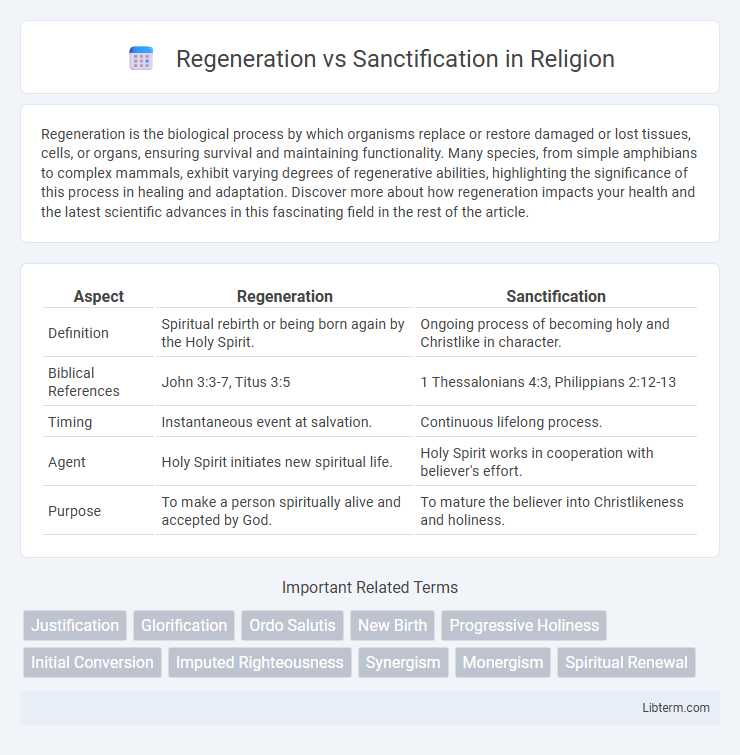Regeneration is the biological process by which organisms replace or restore damaged or lost tissues, cells, or organs, ensuring survival and maintaining functionality. Many species, from simple amphibians to complex mammals, exhibit varying degrees of regenerative abilities, highlighting the significance of this process in healing and adaptation. Discover more about how regeneration impacts your health and the latest scientific advances in this fascinating field in the rest of the article.
Table of Comparison
| Aspect | Regeneration | Sanctification |
|---|---|---|
| Definition | Spiritual rebirth or being born again by the Holy Spirit. | Ongoing process of becoming holy and Christlike in character. |
| Biblical References | John 3:3-7, Titus 3:5 | 1 Thessalonians 4:3, Philippians 2:12-13 |
| Timing | Instantaneous event at salvation. | Continuous lifelong process. |
| Agent | Holy Spirit initiates new spiritual life. | Holy Spirit works in cooperation with believer's effort. |
| Purpose | To make a person spiritually alive and accepted by God. | To mature the believer into Christlikeness and holiness. |
Understanding Regeneration and Sanctification
Regeneration is the spiritual rebirth where a person's heart is transformed by the Holy Spirit, enabling new life in Christ and the forgiveness of sins. Sanctification is the progressive process of becoming holy, marked by growth in spiritual maturity and Christ-like character throughout a believer's life. Understanding regeneration as the initial work of God and sanctification as the ongoing transformation clarifies their distinct roles in the Christian journey.
Biblical Foundations of Regeneration
Regeneration, described in John 3:3-7 as being "born again," signifies a spiritual rebirth initiated by the Holy Spirit, transforming a believer's heart and enabling new life in Christ. Biblical foundations emphasize Ephesians 2:1-5, highlighting that regeneration is God's mercy reviving spiritually dead sinners and granting them faith and repentance. Sanctification, distinct yet related, is the ongoing process of growing in holiness (1 Thessalonians 4:3), empowered by the Spirit after regeneration has occurred.
Biblical Foundations of Sanctification
Sanctification is a progressive work of God's grace, rooted in Scripture passages such as 1 Thessalonians 4:3, which declares God's will for believers to be sanctified. It involves the believer's ongoing transformation into Christlikeness, empowered by the Holy Spirit as described in Romans 8:13-14. Unlike regeneration, which is an instantaneous new birth (John 3:3-7), sanctification unfolds throughout the believer's life, emphasizing obedience, holiness, and spiritual maturity (Philippians 2:12-13).
Key Differences Between Regeneration and Sanctification
Regeneration is the instantaneous spiritual rebirth when a person receives new life through the Holy Spirit, marking the beginning of salvation. Sanctification is the progressive process of becoming holy, involving the continuous transformation of a believer's character and actions to reflect Christ's likeness. While regeneration is a definitive act that changes one's spiritual status, sanctification is ongoing and involves cooperation with the Holy Spirit over time.
The Role of the Holy Spirit in Regeneration
The Holy Spirit initiates regeneration by imparting new spiritual life, transforming a believer from a state of spiritual death to one of spiritual vitality. This divine work enables the individual to become a new creation, marked by an inward renewal and a restored relationship with God. Regeneration is distinct from sanctification, as it specifically pertains to the Holy Spirit's role in the initial rebirth, whereas sanctification involves a progressive process of spiritual growth and moral transformation.
The Role of the Holy Spirit in Sanctification
The Holy Spirit plays a crucial role in sanctification by continuously transforming believers into the likeness of Christ through inward renewal and moral empowerment. Unlike regeneration, which is the initial act of spiritual rebirth, sanctification is an ongoing process where the Holy Spirit guides, convicts, and strengthens individuals to overcome sin and cultivate spiritual virtues. This dynamic work of the Holy Spirit ensures progressive holiness and spiritual maturity throughout the believer's life.
Regeneration: The New Birth Explained
Regeneration, often referred to as the new birth, is the spiritual transformation that occurs when a person is born again by the Holy Spirit, marking the beginning of a new life in Christ. This divine act renews the sinner's heart, enabling them to respond to God with faith and repentance, and distinguishes believers as new creations according to 2 Corinthians 5:17. Unlike sanctification, which is a progressive process of spiritual growth, regeneration is an instantaneous change that initiates a believer's relationship with God.
Sanctification: The Process of Spiritual Growth
Sanctification is the ongoing process of spiritual growth where believers progressively reflect Christ's character through the work of the Holy Spirit. Unlike regeneration, which is the initial act of being born again and receiving new spiritual life, sanctification involves continual transformation and maturity in faith, holiness, and obedience. This lifelong journey includes practices such as prayer, studying Scripture, and fellowship, enabling believers to grow in grace and righteousness.
Practical Implications for Christian Living
Regeneration, the initial spiritual rebirth, empowers believers with new life in Christ, enabling a fundamental transformation of the heart and mind. Sanctification is the ongoing process of growing in holiness, marked by daily obedience, resisting sin, and cultivating Christlike character. Practical Christian living involves embracing regeneration as the foundation of salvation and actively pursuing sanctification through prayer, Scripture study, and community fellowship to manifest spiritual maturity.
Regeneration and Sanctification in Christian Theology
Regeneration in Christian theology refers to the spiritual rebirth where a person is made spiritually alive through the Holy Spirit, marking the beginning of salvation. Sanctification is the ongoing process of being made holy, where believers are progressively transformed into the likeness of Christ through the work of the Holy Spirit. While regeneration is a definitive act that initiates the believer's new life, sanctification is a lifelong journey of spiritual growth and moral renewal.
Regeneration Infographic

 libterm.com
libterm.com